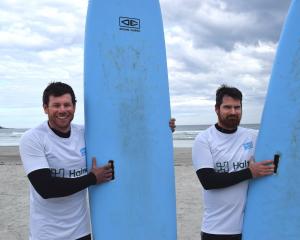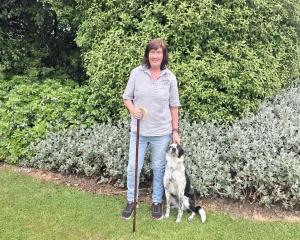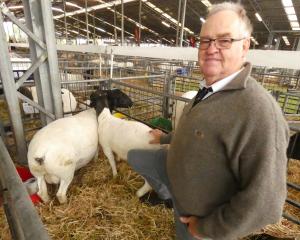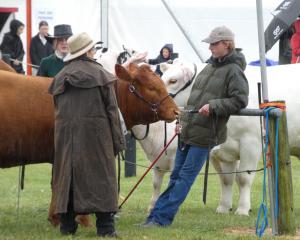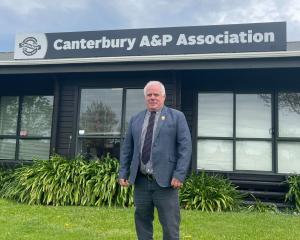

For rescue dog Mick — who was competing in this week’s Tarras Collie Dog Club centennial trials at Lindis Downs — was destined to be put down due to a badly broken leg.
That was before Westland woman Kate Nolan stepped in and said the good-looking heading dog was too nice for such a demise.
She paid for the operation on his leg and kept him as a house pet for several years before being told that he was too big for an inside dog and she would have to move him on.
After whitebaiting season on the West Coast two and-a-half years ago, Beau Trevathan called in and ended up taking Mick home to Tarras with him, with a few tears shed by the dog’s saviour.
While Mick had never seen sheep before, he started working the cats and the hens and Mr Trevathan could see "a little bit of talent".
So he found some sheep to practice on and Mick showed some nice form. Ostensibly Mick was still a pet and Mr Trevathan said he was deriving a lot of pleasure from the dog.
"He’s a house dog, he gets very close to living inside, he’s right on the edge of the door mat," he said.
Every time he saw Miss Nolan, he reminded her that Mick was still her dog and he would never sell him.
While Mick was a newcomer to the Tarras trials, Mr Trevathan has been a regular fixture there since first accompanying his mother, as a baby, 70 years ago.
His father Merv was a very good triallist and, when he was 12, his father told him he could run Tyke at the club’s trials then held at Malvern Downs.
The heading dog, then in his senior years, had qualified several times for the New Zealand championships.
The nervous schoolboy headed out to the ring with Tyke, his left and right side calls written on his hand. But Tyke would not leave his feet, as the sheep waited on the hill.
Next thing, he heard a whistle from the back of the crowd — his father — and Tyke "just took off", knowing exactly what to do.
"I was thrilled as buggery . . I won a dog chain on the day for being the youngest competitor," he recalled.
Mr Trevathan became a club member when he left school in 1969. He served as president in 1977-78 and also as a shepherd, and is now a life member.
Some of his most special trial memories came from his tenure as barman, a position he held for 30-odd years.
He particularly enjoyed the early mornings when returned servicemen would visit the bar, before entering their dogs, for a round of drinks.
"They’d be laughing and telling a few stories. That was the enjoyable part. They’d be talking among themselves, I’d be sitting back listening. The respect we had for those fellas . . . and they all enjoyed each other’s company," he said.
Now retired from that position, Mr Trevathan said he was "just here for the pleasure of being here".
And that was the same for another club stalwart, PL Anderson (83), who had been running dogs at the trials since he was 15.
It was an important event on the district’s calendar; Tarras was a small district and it no longer had its own rugby and cricket teams. There was really only golf and the dog trials left, he said.
Describing his chances with his three canine entries, Mr Anderson said he was a "rank outsider" — "my name’s not Ginger", referring to prominent Omarama triallist Ginger Anderson.
His performance this season had been "a little bit below average", as he said not enough training was obvious.
But there was no way he would miss the event — "I couldn’t think of being anywhere else, especially on a day like this", indicating the blue sky above.


